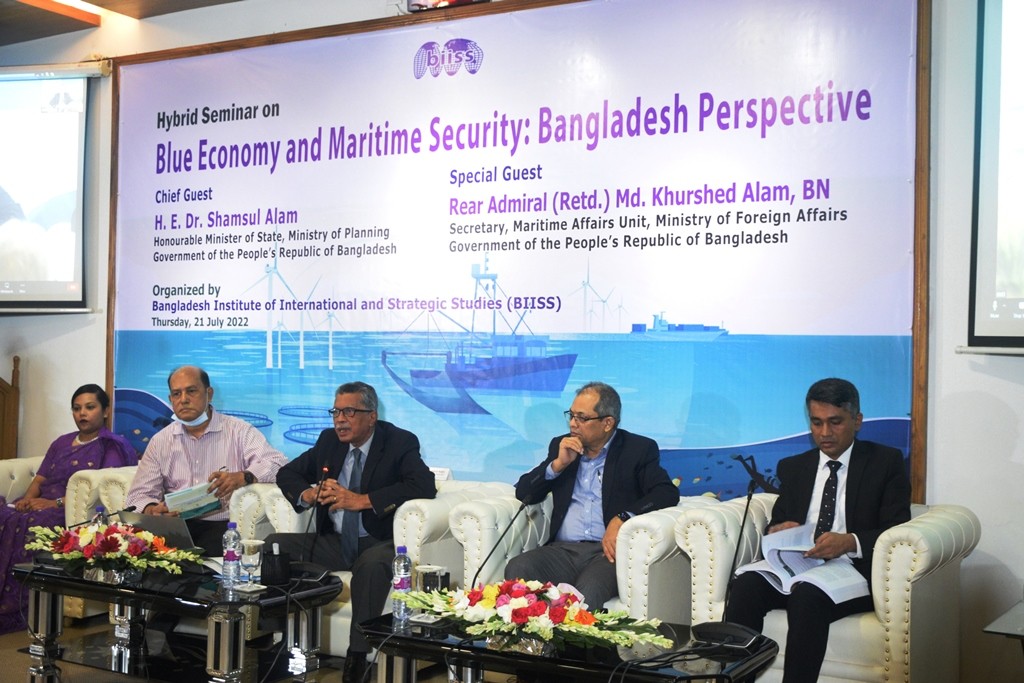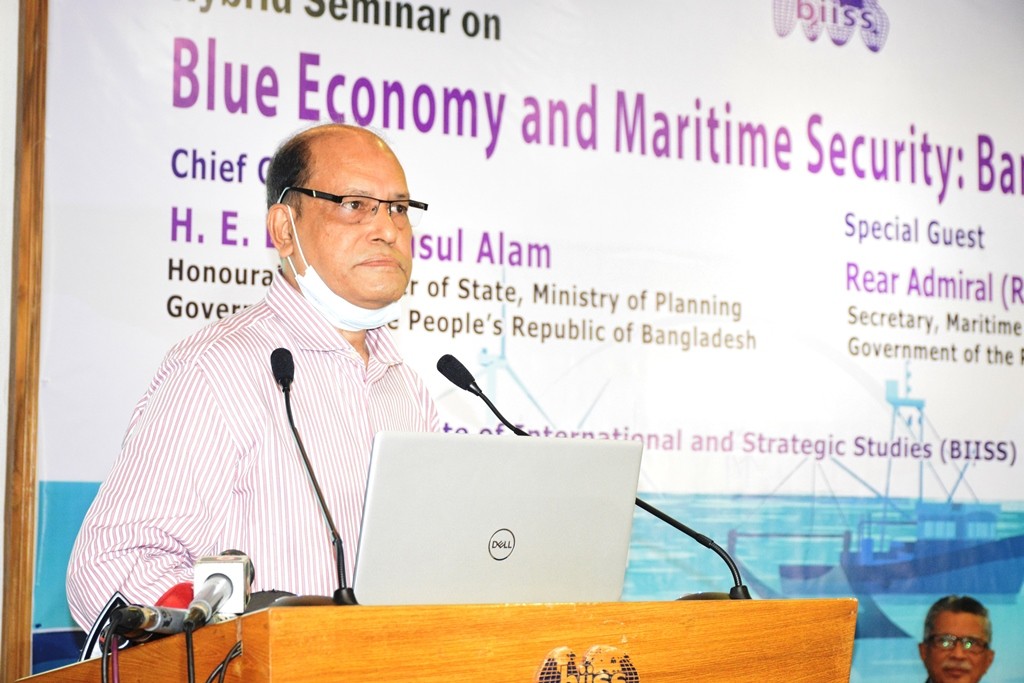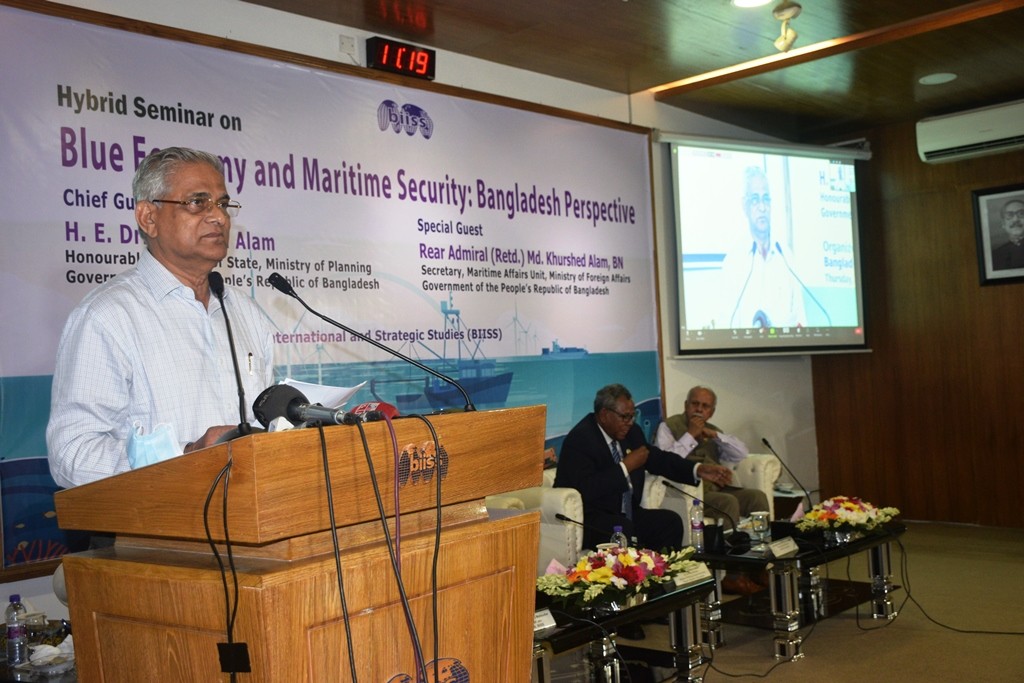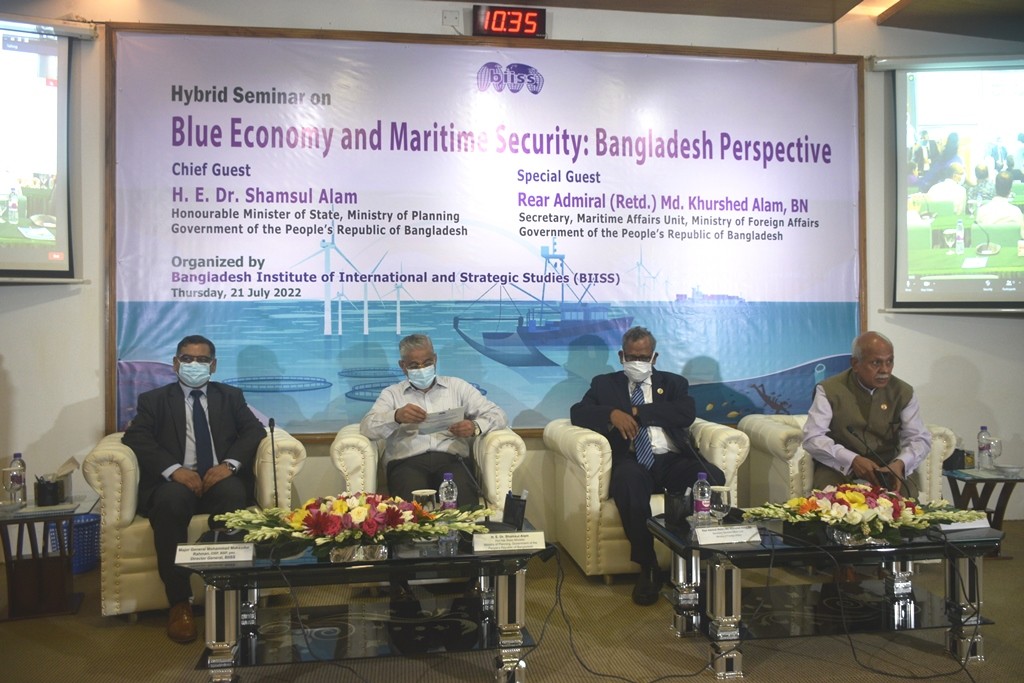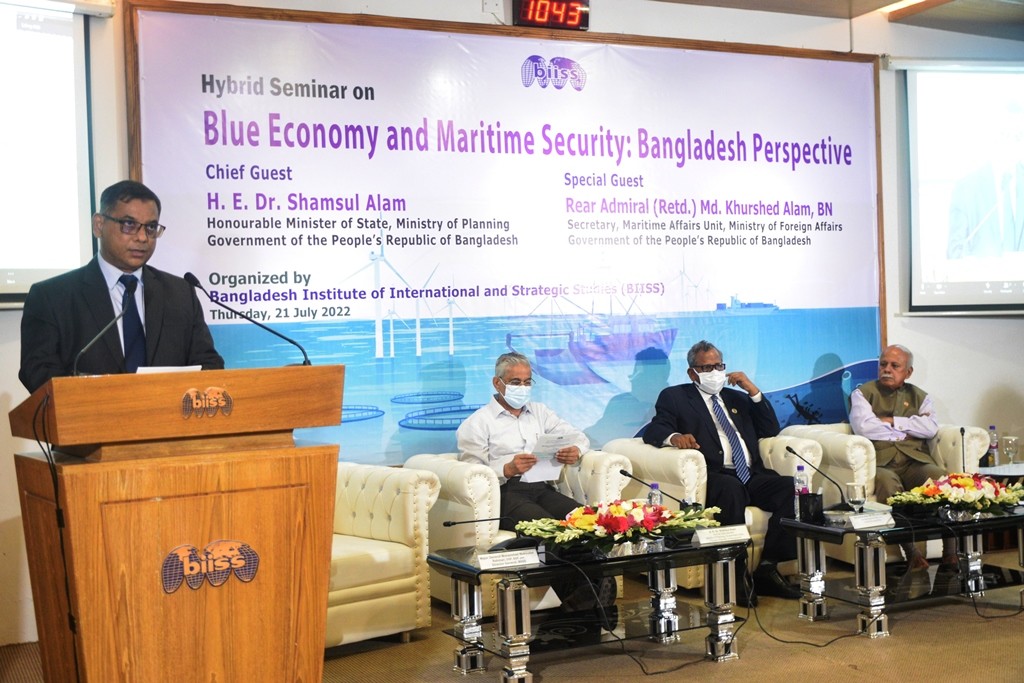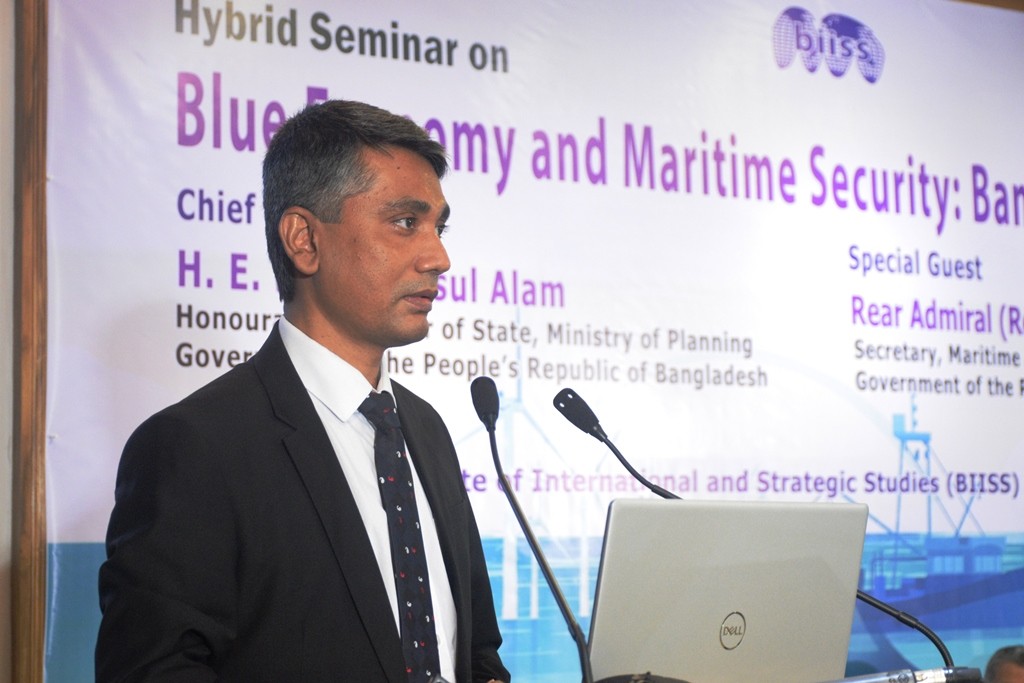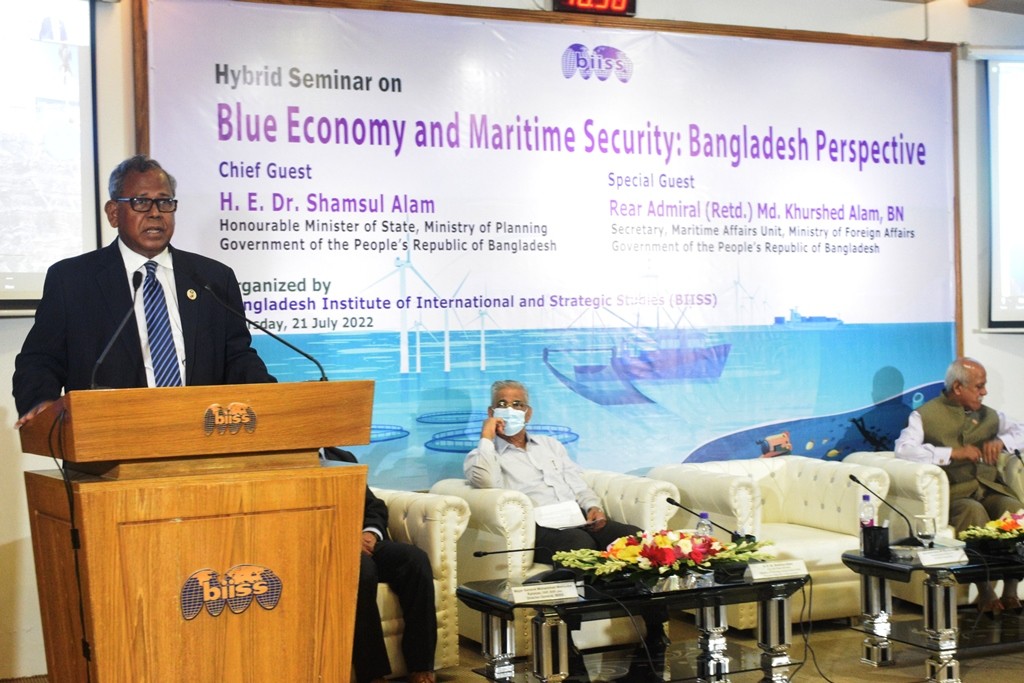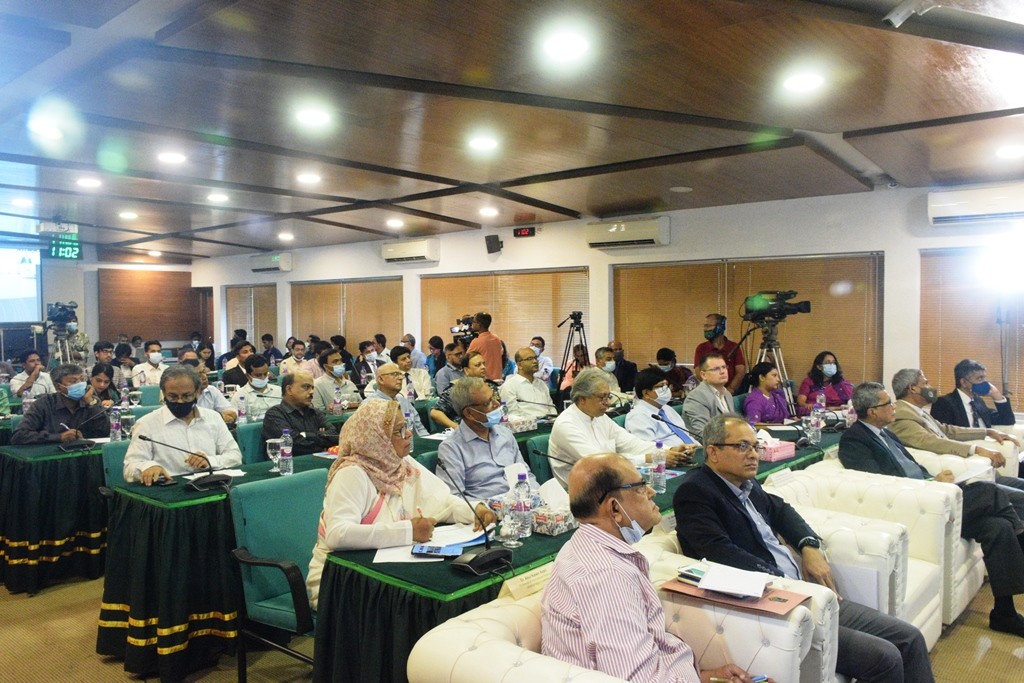Hybrid Seminar on Blue Economy and Maritime Security: Bangladesh Perspective on 21 July 2022
DATE: 2022-07-21
Bangladesh Institute of International and Strategic Studies (BIISS) organized a Hybrid Seminar on Blue Economy and Maritime Security: Bangladesh Perspective on 21 July 2022. H. E. Dr. Shamsul Alam, Minister of State, Ministry of Planning, Government of the People’s Republic of Bangladesh, graced the seminar as the Chief Guest. Rear Admiral (Retd.) Md. Khurshed Alam, BN, Secretary, Maritime Affairs Unit, Ministry of Foreign Affairs, Government of the People’s Republic of Bangladesh, attended the seminar as the Special Guest. Ambassador Kazi Imtiaz Hossain, PAA, Chairman, BIISS, chaired the Inaugural Session. Major General Mohammad Maksudur Rahman, OSP, BSP, psc, Director General of BIISS, delivered the welcome address. The inaugural session was followed by a working session chaired by Ambassador M. Humayun Kabir, President of Bangladesh Enterprise Institute (BEI).
In his welcome address, Major General Mohammad Maksudur Rahman, OSP, BSP, psc, Director General of BIISS, noted how Bangladesh followed the legacy of Bangabandhu by peacefully solving maritime disputes with its neighbours. Now, under the dynamic leadership of Honourable Prime Minister Sheikh Hasina, the country is moving forward to utilising its marine resources and ensuring maritime security. He emphasised on creating a blue economy belt to tap the huge potential of the sea resources.
The Chief Guest of the seminar, H. E. Dr. Shamsul Alam, Minister of State, Ministry of Planning, Government of the People’s Republic of Bangladesh, underlined the importance of the blue economy to Bangladesh’s future sustainable development efforts. Resource exploration and exploitation were two of the key points he made in regard to the blue economy’s long-term viability and efficient use. He highlighted the importance of knowledge mobilization and conducting research on the subject matter. He advocated for a separate ministry for the blue economy or a separate division under the Ministry of Science and Technology to coordinate plans for harnessing the potential of vast sea resources in the Bay of Bengal.
The Special Guest, Rear Admiral (Retd.) Md. Khurshed Alam, BN, Secretary, Maritime Affairs Unit, Ministry of Foreign Affairs, Government of the People’s Republic of Bangladesh, talked about several dimensions of the blue economy, such as marine fisheries, mariculture, shipping, fishing, oil, gas and minerals, maritime monitoring control and surveillance, marine-based energy, etc., which are crucial for Bangladesh. He highlighted the vast potential of the blue economy for Bangladesh and underscored the importance of its sustainable utilisation. He identified a few challenges related to the governance of the blue economy, including maritime industries, maritime safety and security, maritime education, maritime pollution, and marine resources.
Ambassador Kazi Imtiaz Hossain, PAA, Chairman, BIISS, highlighted oceans as the lifeline for humankind and underscored the potential of the blue economy for Bangladesh. He pointed out some of the key challenges linked to maritime security. He acknowledged the contribution of the country’s Navy, Coast Guard, and other security agencies in addressing such challenges.
Ambassador M. Humayun Kabir, President of Bangladesh Enterprise Institute (BEI), presided over the working session and highlighted several key points that include the development of key infrastructure for the blue economy, building capacity for the blue economy and maritime security, ensuring equity while exploiting marine resources, and establishing a maritime community in the Bay of Bengal region.
Dr. Abul Kalam Azad, Professor of International Relations, Jahangirnagar University, made a presentation on “Blue Economy and Ocean Governance: Bangladesh Perspective”. He discussed four main pillars of ocean governance—legal, political, institutional, and capacity building. He also talked about four components of the blue economy: oceans as natural capital, oceans as livelihoods, oceans as good business, and oceans as drivers of innovations.
Dr. Delwar Hossain, Professor of International Relations, University of Dhaka, and Member of Bangladesh Public Service Commission, in his presentation on “Maritime Security and Strategy in the Bay of Bengal”, discussed security dynamics, strategic elements and emerging trends in the Bay of Bengal. He emphasised on cooperative security framework for the Bay of Bengal. He also identified several non-traditional security challenges and underscored the importance of proactive role of the littoral powers in building the Bay of Bengal community for mutual prosperity and peace.
In her presentation titled “Nexus between Maritime Security and Blue Economy: Implications for Bangladesh in the Post-Covid Era”, Ms. Moutusi Islam, Research Fellow, BIISS, highlighted major schools of thought regarding these two concepts—blue economy and maritime security. She mentioned the key opportunities of the blue economy and suggested formulating legal and institutional frameworks to better integrate the blue economy and maritime security.
Dr. Mahfuz Kabir, Research Director, BIISS, in his presentation on “Bangladesh’s Economic Prospect in the Bay of Bengal”, reviewed Bangladesh’s policies for harnessing the blue economy, by drawing particular attention to three important documents, namely Bangladesh Delta Plan 2100, 8th Five Year Plan, and the Perspective Plan of Bangladesh. He talked about how regional organisations like BIMSTEC can be utilised in harnessing the blue economy. He advocated for the construction of Special Economic Zones (SEZs) in the coastal districts.
There was an open discussion session in the seminar. Senior officials from different ministries, ambassadors and high commissioners, senior civil and military officials, media, academia, think tanks, business personalities, students and teachers from different universities participated in the session. They stressed the importance of the blue economy and marine resources to the country’s economy and future development endeavours. They also highlighted different issues of maritime security in the context of Bangladesh.

